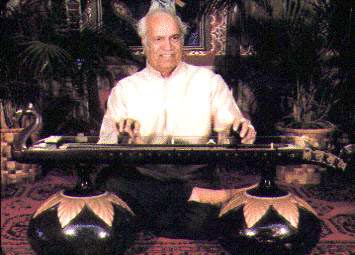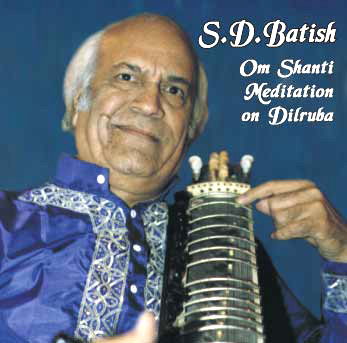Pandit Shiv Dayal Batish
Raga Manavati
Ashwin Batish and family Live
The UC Theater, Berkeley, California.
Meena Batish
Words by Ghalib
Music by S.D. Batish
Phone: (831) 423-1699

My Episode with the Beatles and George Harrison
by Pt. Shiv Dayal Batish

My daughter, Surendra, who usually was in charge of taking phone calls, took the receiver and said the usual hello. The caller in this case was none other than our old friend Mr. Keshav Sathe, who gave her the good news. There was a film of the Beatles by the name of "Help", which was in production, and for which they needed a few Indian musicians to provide background music in some special sequences. On inquiring as to what his papa would be required to play, Mr. Sathe told her that the Vichitra Veena would be fine, as the other guys with Flute and Sitar had already been contacted and confirmed. Surendra told Mr. Sathe to wait a second and she came to me to tell the whole story. I took the receiver and thanked Satheji and said that I would be most happy to come for these recording sessions.

A couple of days later I found myself in one of the typical English studios where the director of the film "Help" was present along with his other assistants, waiting for our gang of about four musicians. The stage was all set for the sequences on which the pieces of Indian music were required to be dubbed.
I was quite impressed by the kind of atmosphere in this side of the film world having had a good deal of experience with the Indian movie studios. They had quite a variety of equipment - microphones, booms, and lights. There was also a big metronome emitting a blinking light on each required beat as well the sound of loud ticking sound on each beat.
We barely finished tuning our instruments when one of the English musicians came to us and said "You can't work all the time mate! This is tea time and you should stop work, that's the rule." I was taken aback by his remark. This was most unlike India where once you have entered the studio you were supposed to keep working till lunch time. Anyway we went to the canteen and soon had our tea with some snacks.
This sequence of talking and meeting other musicians was very interesting and exciting. We made some new friends and for the first time I felt the air of pride of my profession. Everyone seemed to be so concerned about our well being and comfort.
Back in the studio, the other musicians who had become friends by now came to look at our instruments. They were especially fascinated by the image of the wooden head of the peacock on my Vichitra Veena, and like the typical British wit, one of them came near the instrument and started praising its workmanship. In another instant he stood near the peacock head and pretended to lure the bird with some grain in his hand to which all of us had a great laugh.
The studio session lasted for the whole day during which some Vichtra Veena pieces of Beatles song lines were played by me, including some background pieces of some ragas which were used in the sequences of the goddess "Kali," Mr. Sathe, the sitarist Mr. Motihaar, and the flutist, each played separate pieces of music to be used as and when the director required them in the film. At the end of the day the director came and thanked us all for our good work and promised to meet again as soon as some more work on Indian music was required. We thanked him, and after bidding goodbye to other musicians, we took their leave.
Here is one of the songs that got released on the album although it did not include the name of the musicians for some reason.
Here is the track played behind the chase scene
A few months passed by. The film "Help" made a great name for itself, as well as respect and success for it's producers. At the BBC studio at Bush House our gang of four musicians met and talked about the whole episode. Working with the Beatles had not only earned us fame and popularity in the West, it had also brought us respect within our own Indian community.
One day, a few months latter, the telephone rang again at the Birchington road residence. This time it was not the film director. It was someone from the Beatles house. On asking as to what was the whole thing about, we were told that Mr. George Harrison of the Beatles was interested in meeting Mr. Batish in connection with giving lessons to his wife, Patty Harrison, on the Dilrubha. He said that the Harrisons also required a Dilrubha and requested us to get one for them from India. Surendra told them that it would take some time for the instrument to be shipped to England, to which they said they didn't mind. Surendra told them that we would place an order with our music store in Bombay on phone and let them know as soon as the order was confirmed.

Within about fifteen days, a batch of three Dilrubha instruments arrived in Tukesbury, at the house of one of our acquaintances who brought the instruments from India as a special favor. I went to collect them and by evening was back with the instruments. The next day we informed Mr. Harrison about the arrival of their instrument and he promised to send his driver to take me to his residence.
Next day, at the appointed time the driver arrived and knocked at the door. Our youngest son Ravi, opened the door and ushered him in and up a flight of stairs to the second floor. A very polite person, he smiled as he met and shook hands with me, praising the smart moves of young Ravi and said he was quite impressed by the kind of welcome he received. Soon after I took the Dilrubha and taking leave of my wife and kids, started to go along with him. Mr. Harrison's house was in Sussex County in the South of London, and it took a while to reach there. But the driver kept me entertained and busy by bringing various topics of common interest which helped pass the time during this long journey.

We entered Sussex county and zig zagged through various bylanes and streets. Finally, the driver announced and pointed towards the Harrison's home. I was quite impressed with its front view. On the left side of the front door I saw a Rolls Royce, fully painted with sort of graffiti, and was quite amazed with the art work on its huge body. In curiosity I asked the driver as to whose car this would be. He immediately responded that it was none other than the other Beatle Mr. John Lennon, and added "Look what he has done to his beautiful Rolls!"
The driver lead me from the front gate and ushered me in the big sitting room. My immediate reaction on seeing the spaciousness of this semi-dark hall was that of awe and wonder. Peace was prevelent in the room which was thoroughly carpeted with a variety of oriental carpets. To me it looked as if the whole room was partitioned into segments, perhaps, with a view to make it possible and convenient for the occupant groups to be able to sit separately without loosing the visual angle, yet go on in their activities undisturbed.
On seeing me entering from the door, Mr. Harrison stood up and came forward with folded hands observing the Indian style of Namaste and then shook hands with me. A very beautiful young lady who was standing close behind him was introduced as Mrs. Patty Harrison. She was the one, who was to become my future pupil in learning the Dilrubha.
The couple led me to the inner segment of the room where they asked me to take my seat. In the outer segment there were three people sitting and talking in low tones, which made me curious to know about them. Mr. Harrison told me that they were the other members of the group i.e. John, Paul, and Ringo. He then raised his voice a little addressing them as he introduced me. They were real nice and waved their friendly hands as they smiled and then again went on in their serious discussion.

I sat with the Harrisons and took out the Dilrubha from the cover, while telling them the whole story about how it had been especially brought by some old friends who had recently flown in from Bombay. Patty was so filled with awe and wonder to behold the instrument. As soon as they had finished patting the instrument and getting acquainted with it, I took it in my hands and started playing a few notes to show how it sounded. Patty was simply amazed with the tone, and Mr. Harrison happily thanked me for bringing it in time saying that she was so anxious to get it and start learning on it.

From that day onwards, she started taking lessons on the instrument . I must say that with the kind of smart student that she was she lost no time in learning the rudiments which I introduced to her. Very soon she started getting steady with both hands, while nicely controlling the instrument against her left shoulder. In a few days, the exercises which I played for her were mastered and played as accurate as they were taught by me.
The driver in the mean time, kept coming whenever the lesson was scheduled. He even brought an old silver watch for my youngest son Ravi as a token of his appreciation for being welcomed at our house. Also during the brief period of my going to the Harrisons I found the beautiful couple extremely good natured and respectful. I cannot forget the kind of welcome which used to be given to me in their house, and shall cherish it always.
 We'd like to extend our deepest regrets on the passing of George Harrison, a great personality and friend. His involvement with Pandit Shiv Dayal Batish, during and after the making of the Beatles movie Help, was always one of grace and charm. Our deepest sympathies go out to his wife Olivia and his son Dhani.
We'd like to extend our deepest regrets on the passing of George Harrison, a great personality and friend. His involvement with Pandit Shiv Dayal Batish, during and after the making of the Beatles movie Help, was always one of grace and charm. Our deepest sympathies go out to his wife Olivia and his son Dhani.

Cat#: BR4002CD Price: $17.99
|
Om Shanti Meditation
|
Issues:
1 2 3 4 5 6 7 8 9
|
|
|
email: info [at] batish.com
copyright ©1995 - Present Time ---- Batish Institute. All rights reserved. Intended For Personal Use Only. No part of the information here may be reproduced or utilized in any form or by any means, electronic or mechanical, including photocopying and recording, or by any information and storage retrieval system, without specific written permission from the Batish family.
S.D. Batish
BBC, England